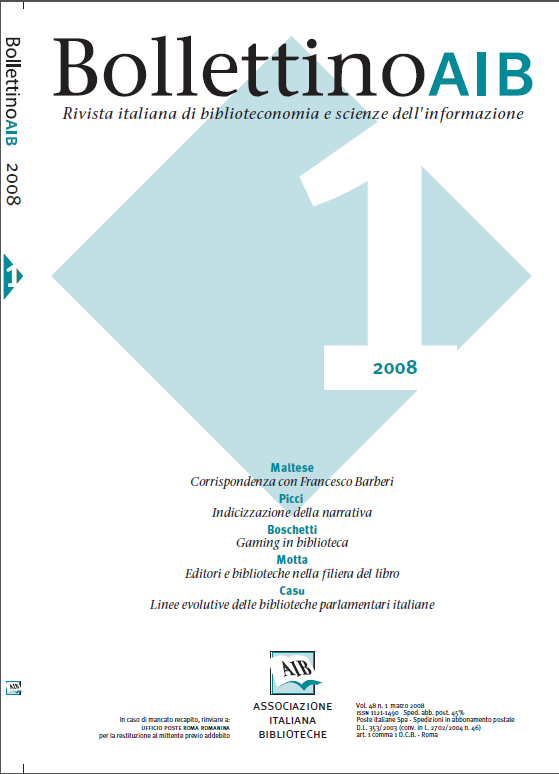Il gaming in biblioteca
Contenuto principale dell'articolo
Abstract
The aim of this article is to contribute to the discussion on the more innovative aspects of modern public libraries. In this case a specific subject is dealt with: "gaming in the library", and it is presented through a brief documentary and experience-related report, a case study and the proposal of some themes concerning the current debate.
In literature "gaming in the library" indicates the introduction of commercial videogames into public library collections allowing them to be enjoyed on site and/or lent and the use and/or the creation of videogames for didactic and promotional reasons, connected with the various objectives, activities and services of libraries.
The context in which studies and research on gaming in the library are developed is that of game studies, a subject that investigates the medium from numerous viewpoints using all sorts of approaches and methodologies. In the library area these studies are mainly carried out in the United States and the United Kingdom. Scholars and librarians have dealt with the matter by illustrating their reasons for supporting the introduction of videogames in libraries: they have documented some experiences, indicated practical solutions both from the point of view of the use of commercial videogames and of that of the creation of original videogames; they have also done research on the behaviour of gamers in libraries in such a perspective, illustrated the uses of videogames for bibliographic instruction and literacy information and compiled bibliographic collections.
As regards the introduction of gaming among library services, the most numerous initiatives are found in the USA, where university and public libraries have introduced videogames in their library collections; they also give on-line access to sets of videogames and organize videogame tournaments.
In Italy there are some rare examples of the use of videogames by libraries. Among these is the case of the Massa Civic Library that has created a videogame for renewing the library methods of communication, promotion and didactics. The most important point of the project was the involvement of a group of young people in the videogame's invention, development, creation and testing. The library directed the job from the librarianship and didactic viewpoint and directly followed all phases of the software's creation.
The debate is still open in the library world: some fear that the introduction of videogames takes from the nature of the library and means that librarians will no longer promote books and reading, others report the violent contents and/or the instigation to anti-social behaviour that videogames present. Among Italian librarians the debate is fundamentally concentrated on the validity of the choice to use financial and human resources for the introduction of videogames in libraries when the majority of our libraries already have minimum or even insufficient operation standards as a public reading service. Among United States librarians, especially the younger set, there is a certain enthusiasm for gaming in the library, but there are also critical voices that invite deeper reflection on the use and consumption of new technologies.
In literature "gaming in the library" indicates the introduction of commercial videogames into public library collections allowing them to be enjoyed on site and/or lent and the use and/or the creation of videogames for didactic and promotional reasons, connected with the various objectives, activities and services of libraries.
The context in which studies and research on gaming in the library are developed is that of game studies, a subject that investigates the medium from numerous viewpoints using all sorts of approaches and methodologies. In the library area these studies are mainly carried out in the United States and the United Kingdom. Scholars and librarians have dealt with the matter by illustrating their reasons for supporting the introduction of videogames in libraries: they have documented some experiences, indicated practical solutions both from the point of view of the use of commercial videogames and of that of the creation of original videogames; they have also done research on the behaviour of gamers in libraries in such a perspective, illustrated the uses of videogames for bibliographic instruction and literacy information and compiled bibliographic collections.
As regards the introduction of gaming among library services, the most numerous initiatives are found in the USA, where university and public libraries have introduced videogames in their library collections; they also give on-line access to sets of videogames and organize videogame tournaments.
In Italy there are some rare examples of the use of videogames by libraries. Among these is the case of the Massa Civic Library that has created a videogame for renewing the library methods of communication, promotion and didactics. The most important point of the project was the involvement of a group of young people in the videogame's invention, development, creation and testing. The library directed the job from the librarianship and didactic viewpoint and directly followed all phases of the software's creation.
The debate is still open in the library world: some fear that the introduction of videogames takes from the nature of the library and means that librarians will no longer promote books and reading, others report the violent contents and/or the instigation to anti-social behaviour that videogames present. Among Italian librarians the debate is fundamentally concentrated on the validity of the choice to use financial and human resources for the introduction of videogames in libraries when the majority of our libraries already have minimum or even insufficient operation standards as a public reading service. Among United States librarians, especially the younger set, there is a certain enthusiasm for gaming in the library, but there are also critical voices that invite deeper reflection on the use and consumption of new technologies.
Dettagli dell'articolo
Fascicolo
Sezione
Articoli

Questo lavoro è fornito con la licenza Creative Commons Attribuzione - Condividi allo stesso modo 4.0.
